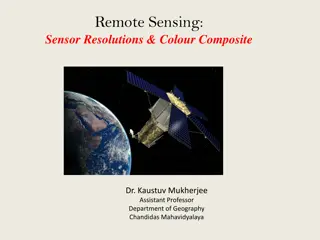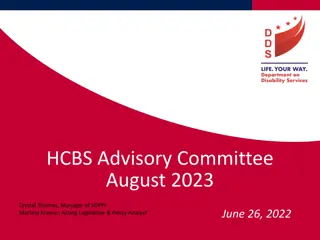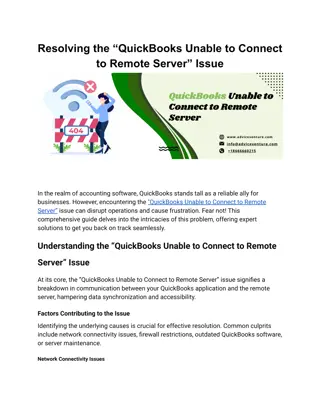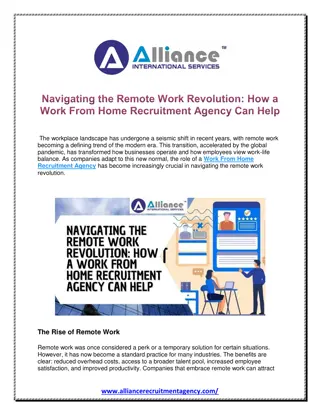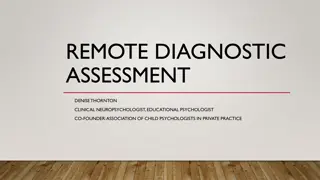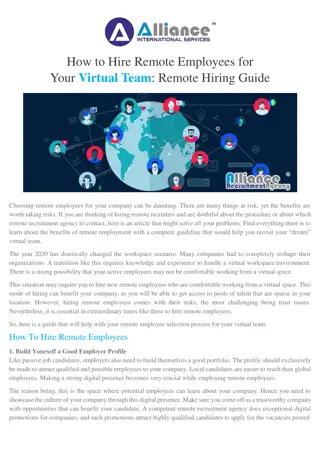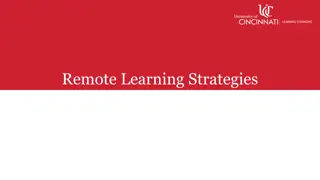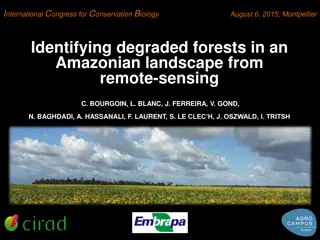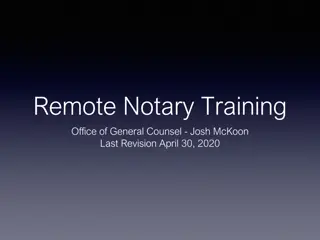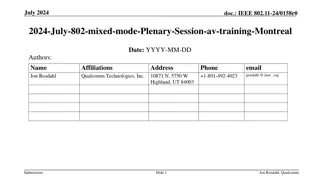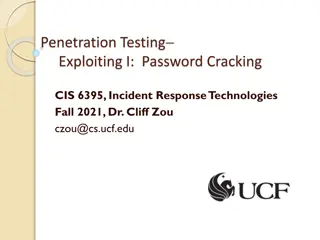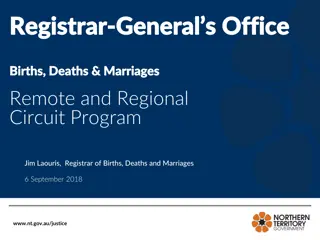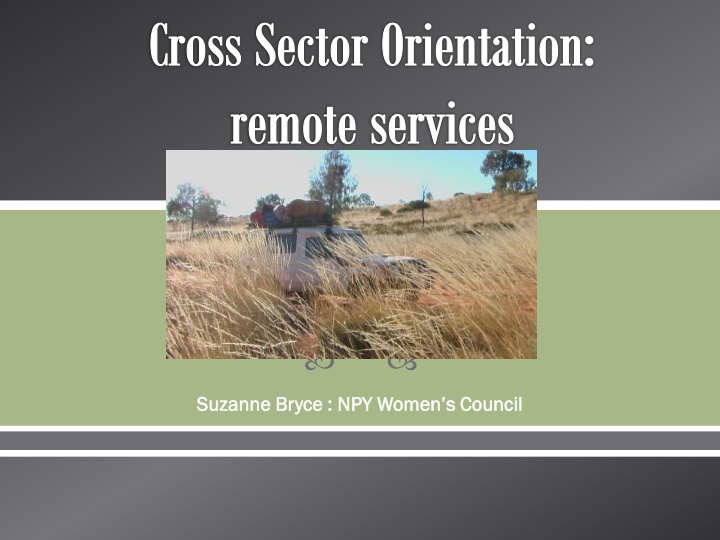
NPY Women's Council Services and Communities Overview
Learn about the NPY Women's Council, a vital organization operating in remote cross-border regions of Australia and offering a variety of essential services such as disability advocacy, aged care, domestic violence support, and more. Discover the communities they serve and the core services provided in these areas.
Download Presentation

Please find below an Image/Link to download the presentation.
The content on the website is provided AS IS for your information and personal use only. It may not be sold, licensed, or shared on other websites without obtaining consent from the author. If you encounter any issues during the download, it is possible that the publisher has removed the file from their server.
You are allowed to download the files provided on this website for personal or commercial use, subject to the condition that they are used lawfully. All files are the property of their respective owners.
The content on the website is provided AS IS for your information and personal use only. It may not be sold, licensed, or shared on other websites without obtaining consent from the author.
E N D
Presentation Transcript
Cross Sector Orientation: remote services Suzanne Bryce : NPY Women s Council Suzanne Bryce : NPY Women s Council
The NPY Womens Council was formed in 1980 and The NPY Women s Council was formed in 1980 and operates in the cross border region of the Northern operates in the cross border region of the Northern Territory, South Australia and Western Australia, covering Territory, South Australia and Western Australia, covering an area of 350,000 square kilometres (see map). an area of 350,000 square kilometres (see map). Anangu Anangu (Aboriginal people) living in (Aboriginal people) living in Ngaanyatjarra Pitjantjatjara and Pitjantjatjara and Yankunytjatjara Yankunytjatjara lands (Western Desert language region) share strong cultural affiliations. language region) share strong cultural affiliations. Ngaanyatjarra, , lands (Western Desert
NPY Womens Council NPY Women s Council NPY NPY Women's Council currently employs over 100 staff administering the following Women's Council currently employs over 100 staff administering the following services services: : Disability Advocacy and Support Disability Advocacy and Support Aged Aged Care Support Care Support and Advocacy including Palliative and Advocacy including Palliative Carer Carer Respite Regional Centre Respite Regional Centre Domestic Violence Service Domestic Violence Service Youth Services Youth Services Child Nutrition Program Child Nutrition Program Intensive Family Support Intensive Family Support Service Service Walytjapiti Child Advocacy Program Child Advocacy Program Ngangkari Ngangkari (traditional healer) (traditional healer) Program Uti Uti Kulintjaku Kulintjaku Federal Emergency Relief funds Federal Emergency Relief funds Tjanpi Desert Weavers Tjanpi Desert Weavers Walytjapiti Program
What is on communities Core services: Core services: small places small places Clinic Clinic Primary School Primary School Store Store Community Community Office Office
What is on Communities Bigger Bigger communities may have communities may have Police Art Centre Secondary School Childcare/ASC Night Patrol Youth Programs Family Centre Centrelink agent ATM Renal Dialysis facility Aged Care programs Access to internet Mobile phone coverage Community media centre Rangers Child Protection (WA)
What is in communities Visiting services Visiting services Allied Health Vet Mental Health services Drug and Alcohol services Child Protection Centrelink NT Housing Contractors Government consultants Red Cross, Catholic Care, Lutheran Community Care, MA, World Vision, Save the Children Legal Aid Corrections JSA Financial Councellors
Working with community strengths Family: foundation for Aboriginal community and identity. Several generations together. Language: most Aboriginal people speak several Aboriginal languages. Cultural strength through knowledge of language, kinship and country Creativity, resourcefulness, flexibility, patience, humour Hope for a good life and engagement with accessable services .
Challenges Too many visitors FIFO Lack of appropriate work spaces Conflicting priorities Poverty Remoteness Health burden Language, literacy Interagency collaboration Cultural differences,eg time Lack of accommodation
Planning your visit Who do you need to talk to? (include Aboriginal community leaders and board members; local service managers and staff; ESM and GEO). Plan a few weeks in advance Know what is happening in the community Check for appropriate dates with locals Let community know you are coming and send notice with photo and explain your visit Follow protocols for accommodation Can you help by bringing out supplies? Check policies: can you transport community members home from Alice? Plan and still know that things can change suddenly
Allow plenty of time to meet with people Allow plenty of time to meet with people
When you arrive Courtesy call to Shire office, to GEO Slow down, windows down - walk Be approachable, say hello Check your promotion notices, stick more up
Consideration Remember people are busy and have family commitments, work and voluntary responsibilities, cultural obligations and other MEETINGS. Introduce yourself clearly, shake hands, remember names. Explain why you are on the community, seek advice from nominated community members about who to see, what to do. Seek permission from senior Aboriginal people about where to walk or drive. Don t make new roads or tracks. Be respectful when visiting people at their home. Stand at the fence and call out. Maintain a sense of humour
Meeting with people Remember and practice your cultural awareness training. Be slow and steady: don t rush people to make decisions or to do it your way Be prepared to talk to everyone, listen carefully Meet with people where they are comfortable (sitting outside store, in creek bed, on their verandah meetings don t have to be in meeting rooms) - privacy be approachable, allow people to know where to find you and how to contact you Use properly identified interpreters Use good plain English
After you leave the community Follow up on requests Do what you said you would do Have people been thanked and/or paid for working with you? Let people know what you have done Send back photos and stories
Useful Resources and Readings Kartiya are like Toyotas Whitefellas are like traffic lights Little Red Threat Book Working Well Guide NITV Mpwentwe Country www.waru.org Red Kangaroo Books CAAMA Shop Walpiri Women s Voices TRADITIONAL HEALERS OF CENTRAL AUSTRALIA: NGANGKARI Tjanpi Desert Weavers



